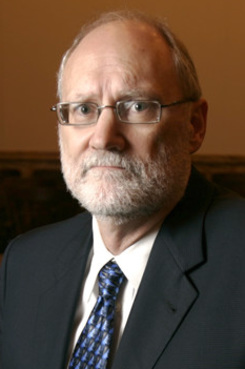Ninth Circuit Adopts #MeToo Recommendations Against Sexual Harassment
The chief judge said the goal is to make policies and procedures more accessible, understandable and effective.
May 21, 2018 at 05:01 PM
3 minute read
 U.S. Court of Appeals for the Ninth Circuit. Photo: Jason Doiy/ALM.
U.S. Court of Appeals for the Ninth Circuit. Photo: Jason Doiy/ALM. The U.S. Court of Appeals for the Ninth Circuit has taken steps to improve its workplace rules after the #MeToo movement swept through the federal court last December.
Chief Judge Sidney R. Thomas announced on Monday that the federal appeals court has accepted several recommendations from a special committee he convened in December to look into workplace policies and procedures for employees.
 Chief Judge Sidney Thomas.
Chief Judge Sidney Thomas. “In an effort to promote and safeguard a healthy working environment, our goal is to make our policies and procedures more accessible, more understandable and more effective,” he said.
The adopted changes include establishing a director of workplace relations to oversee workplace issues that arise within the Ninth Circuit courts and provide “discrimination and sexual harassment training,” according to the release by the appeals court.
The release noted that employees, starting in October, will have 180 days to bring a complaint under a revised employment dispute resolution policy, instead of the existing 30-day window.
Other recommendations appear to be aimed at making it easier for employees who have experienced sexual misconduct to come forward.
Changes included “reducing barriers to reporting workplace misconduct”, “providing multiple avenues for employees to seek informal advice on workplace issues” and giving the option of “assisted resolution of workplace disputes.”
The moves come after multiple women accused now-retired Judge Alex Kozinski of engaging in sexually inappropriate behavior. Many of the women worked directly under or with the judge.
Thomas later convened a “special ad hoc committee” to look into workplace issues. The committee, chaired by Circuit Judge M. Margaret McKeown, includes three other judges in the Ninth Circuit and one San Diego attorney.
“These recommendations are the result of a broad outreach effort over several months to both current and former law clerks and other court employees,” McKeown said. “There was an intensive effort to gather information and hear from court employees about workplace issues.”
The committee said that some of the recommendations came after the committee sent out a questionnaire to “almost 6,000 current and former employees” of the appeals court, other focus groups, and letters to law school deans “soliciting ideas for cooperation between the law schools and the courts with respect to law clerks and externs.”
Separately, U.S. Supreme Court Chief Justice John Roberts also directed a working group last year to review the federal judiciary's procedures “for investigating and correcting inappropriate behavior” in the U.S. courts. That report is expected to be released later this month.
Read More:
Federal Judiciary Updates Congress on Workplace Misconduct Review
Federal Judiciary Unveils First Reforms From Harassment Working Group
Judiciary Closes Kozinski Misconduct Probe, Saying It Can't 'Do Anything More'
After Kozinski Scandal, Federal Judiciary to Review Courthouse Conduct Rules
Wilson Sonsini Partner Talks About Kozinski Clerks 'Waiting, Dying' to Testify in Investigation
This content has been archived. It is available through our partners, LexisNexis® and Bloomberg Law.
To view this content, please continue to their sites.
Not a Lexis Subscriber?
Subscribe Now
Not a Bloomberg Law Subscriber?
Subscribe Now
NOT FOR REPRINT
© 2025 ALM Global, LLC, All Rights Reserved. Request academic re-use from www.copyright.com. All other uses, submit a request to [email protected]. For more information visit Asset & Logo Licensing.
You Might Like
View All
Buchalter Hires Longtime Sheppard Mullin Real Estate Partner as Practice Chair

Reality TV Couple and Pacific Palisades Neighbors Sue City of Los Angeles Over Loss of Homes to Fire
3 minute read
In Resolved Lawsuit, Jim Walden Alleged 'Retaliatory' Silencing by X of His Personal Social Media Account

No Two Wildfires Alike: Lawyers Take Different Legal Strategies in California
5 minute readTrending Stories
- 1Orrick Loses 10-Lawyer Team to Herbert Smith in Germany
- 2‘The US Market Is Critical’: KPMG’s Former Head of Global Legal Services On the Legal Arm of the Big Four Firm Entering the US
- 3Justice Marguerite Grays Elevated to Co-Chair Panel That Advises on Commercial Division
- 4McDermott Continues UK Growth With Another Partner Hire in London
- 52 Texas Lawyers Vie for Prominent Post: 2025-2026 Election
Who Got The Work
J. Brugh Lower of Gibbons has entered an appearance for industrial equipment supplier Devco Corporation in a pending trademark infringement lawsuit. The suit, accusing the defendant of selling knock-off Graco products, was filed Dec. 18 in New Jersey District Court by Rivkin Radler on behalf of Graco Inc. and Graco Minnesota. The case, assigned to U.S. District Judge Zahid N. Quraishi, is 3:24-cv-11294, Graco Inc. et al v. Devco Corporation.
Who Got The Work
Rebecca Maller-Stein and Kent A. Yalowitz of Arnold & Porter Kaye Scholer have entered their appearances for Hanaco Venture Capital and its executives, Lior Prosor and David Frankel, in a pending securities lawsuit. The action, filed on Dec. 24 in New York Southern District Court by Zell, Aron & Co. on behalf of Goldeneye Advisors, accuses the defendants of negligently and fraudulently managing the plaintiff's $1 million investment. The case, assigned to U.S. District Judge Vernon S. Broderick, is 1:24-cv-09918, Goldeneye Advisors, LLC v. Hanaco Venture Capital, Ltd. et al.
Who Got The Work
Attorneys from A&O Shearman has stepped in as defense counsel for Toronto-Dominion Bank and other defendants in a pending securities class action. The suit, filed Dec. 11 in New York Southern District Court by Bleichmar Fonti & Auld, accuses the defendants of concealing the bank's 'pervasive' deficiencies in regards to its compliance with the Bank Secrecy Act and the quality of its anti-money laundering controls. The case, assigned to U.S. District Judge Arun Subramanian, is 1:24-cv-09445, Gonzalez v. The Toronto-Dominion Bank et al.
Who Got The Work
Crown Castle International, a Pennsylvania company providing shared communications infrastructure, has turned to Luke D. Wolf of Gordon Rees Scully Mansukhani to fend off a pending breach-of-contract lawsuit. The court action, filed Nov. 25 in Michigan Eastern District Court by Hooper Hathaway PC on behalf of The Town Residences LLC, accuses Crown Castle of failing to transfer approximately $30,000 in utility payments from T-Mobile in breach of a roof-top lease and assignment agreement. The case, assigned to U.S. District Judge Susan K. Declercq, is 2:24-cv-13131, The Town Residences LLC v. T-Mobile US, Inc. et al.
Who Got The Work
Wilfred P. Coronato and Daniel M. Schwartz of McCarter & English have stepped in as defense counsel to Electrolux Home Products Inc. in a pending product liability lawsuit. The court action, filed Nov. 26 in New York Eastern District Court by Poulos Lopiccolo PC and Nagel Rice LLP on behalf of David Stern, alleges that the defendant's refrigerators’ drawers and shelving repeatedly break and fall apart within months after purchase. The case, assigned to U.S. District Judge Joan M. Azrack, is 2:24-cv-08204, Stern v. Electrolux Home Products, Inc.
Featured Firms
Law Offices of Gary Martin Hays & Associates, P.C.
(470) 294-1674
Law Offices of Mark E. Salomone
(857) 444-6468
Smith & Hassler
(713) 739-1250






